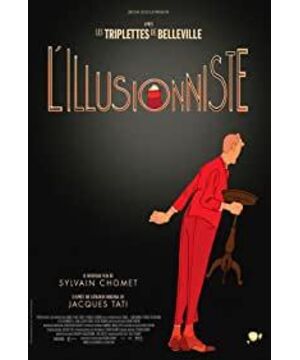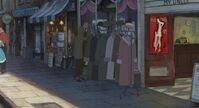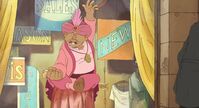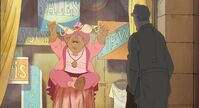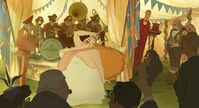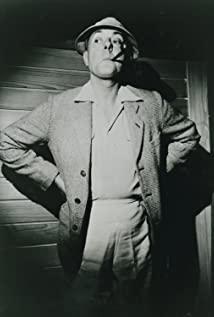The background of the film is actually happening every day: pop rock bands occupy the stage and make the audience go crazy; pop music is spread to the corners of rural towns through machines, and the territory of traditional magicians is getting more and more cramped; There is sadness in the joy woven by the gramophone; ventriloquists sell their dolls and retreat to the corner to beg... The erratic smoke, the continuous rain, the dim light and shadow, the tireless lines and wrinkles, are all rendering this helplessness. , melancholy, sad but calm emotions.
Forced by life, the magician Tatischeff turned around again and again, and the only loyal audience was Alice, a little girl who helped in the countryside. In the country hotel, the magician conjured tips, soap, and new shoes; on the train, the magician conjured the ticket; in a new country and life, the magician conjured bright clothes and endless flowers. pocket money. So some people began to accuse Alice's desire to take blindly as a magician's bottomless pit - even if its root is blameless innocence.
The question is, are Alice's desires overrated? After encountering Prince Charming in the store, Alice held up a coin and thought she could buy the pearl necklace in the cupboard. The salesman shook her head and put it away. The little girl looked at the man behind him. Lead him happily away. It doesn't matter if you don't have a necklace, it doesn't matter if you don't have magic power.
Instead, what Alice brings is underestimated. It was Alice's bowl of soup that made the clown give up suicidal thoughts first, and what the magician insisted on was Alice's excitement and surprise in the face of the performance that never faded. Granted, without Alice, magicians don't have to be on duty in the car wash in the middle of the night in the rain and pay for unplanned coats, heels, and dresses, but without Alice it also means that performances in theaters, small hotels, and women's store windows are lost because of lost Believing in the innocence of magic, it becomes a means of subsistence and loses all dignity.
It was this dignity that Tatischeff was most reluctant to lose. That's why the magician looks so disappointed when Alice accidentally discovers white high heels in a gift box, and rudely dismisses and alienates Alice when she conjures up perfume, underwear, and stockings at the women's store. His burden is too heavy, not because of Alice's endless desires, but because he has to create the image of an omnipotent magician and a meticulous father at the same time.
If the magician sticks to the end, I will think it is a perfect fairy tale and a deep fable of fatherly love - in "Life is Beautiful", the father uses innocent humor to erase cruelty and darkness from his son's childhood, "Life is Beautiful" There are no thieves in the world" (I don't really want to use this example, but I was really moved by it), and some people are willing to use their lives to protect the simplicity. But this is a film that uses halfway to create sadness and emotion: magic is the last sentence left to the little girl is "Magicians do not exist", some people understand it as a condemnation, some people regard it as a sentence about reality A warning, perhaps more kind-hearted people see it as the magician's gentle retreat declaration. I thought about it, but in the end I could only think of it as an irresponsible but frankly whitewashed high-sounding sentence. Abandonment itself confirms that past efforts were carried with too many selfish thoughts.
It's a bit heavy. But the film is a rare good film.
View more about The Illusionist reviews


